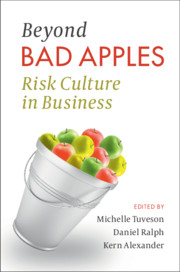Book contents
- Beyond Bad Apples
- Beyond Bad Apples
- Copyright page
- Contents
- Figures
- Contributors
- Acknowledgements
- Introduction
- Part I Risk Culture Conceptual Underpinnings
- Part II A View of Risk Culture Concepts in Firms and Society
- 5 The Changing Risk Culture of UK Banks
- 6 Regulating Agency Relationships and Risk Culture in Financial Institutions
- 7 What Does Risk Culture Mean to a Corporation?
- 8 Values at Risk
- Conclusion
- Index
- References
6 - Regulating Agency Relationships and Risk Culture in Financial Institutions
from Part II - A View of Risk Culture Concepts in Firms and Society
Published online by Cambridge University Press: 22 May 2020
- Beyond Bad Apples
- Beyond Bad Apples
- Copyright page
- Contents
- Figures
- Contributors
- Acknowledgements
- Introduction
- Part I Risk Culture Conceptual Underpinnings
- Part II A View of Risk Culture Concepts in Firms and Society
- 5 The Changing Risk Culture of UK Banks
- 6 Regulating Agency Relationships and Risk Culture in Financial Institutions
- 7 What Does Risk Culture Mean to a Corporation?
- 8 Values at Risk
- Conclusion
- Index
- References
Summary
The chapter analyses the role of financial regulation in facilitating the development of organizational norms to enhance risk culture in financial institutions. The paper suggests that shortcomings in risk culture – particularly as understood through the lens of human agency theory – in large financial institutions are the result of collective agency problems. The paper argues that regulation has a role to play in addressing collective agency problems but that regulators should be selective in what tools they use to enhance risk culture in institutions with consideration given to the regulation of remuneration and trusted financial products. It further suggests that to address collective agency problems in large financial institutions policymakers should consider the utility of a senior managers’ liability regime to incentivize senior officers and board directors to be more proactive and aware of misconduct and other behavior that results in agency costs for the firm and society. The paper concludes that a effective regulation involves a balance between official sector regulation and self-regulation that can channel the collective actions of individuals to improve governance and operations in a way that benefits overall firm performance and which mitigates socially costly behavior.
- Type
- Chapter
- Information
- Beyond Bad ApplesRisk Culture in Business, pp. 165 - 189Publisher: Cambridge University PressPrint publication year: 2020
References
- 1
- Cited by

